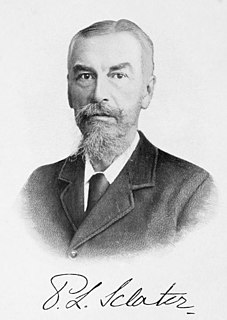
A biogeographic realm or ecozone is the broadest biogeographic division of Earth's land surface, based on distributional patterns of terrestrial organisms. They are subdivided into bioregions, which are further subdivided into ecoregions.

Lemuria, or Limuria, is a hypothesized continent proposed in 1864 by zoologist Philip Sclater to have sunk beneath the Indian Ocean, later appropriated by occultists in fictional accounts of human origins.
Baron Basing, of Basing Byflete and of Hoddington, both in the County of Southampton, is a title in the Peerage of the United Kingdom. It was created in 1887 for the Conservative politician and former President of the Local Government Board, George Sclater-Booth. On his death the title passed to his eldest son, the second Baron, and then to his son, the third Baron. On the latter's death in 1983 this line of the family failed. The title was inherited by the late Baron's first cousin, the fourth Baron. He was the son of Hon. Charles Lutle Sclater-Booth, second son of the first Baron. As of 2010 the title is held by the fourth Baron's grandson, the sixth Baron, who succeeded his father in 2007.

Philip Lutley Sclater was an English lawyer and zoologist. In zoology, he was an expert ornithologist, and identified the main zoogeographic regions of the world. He was Secretary of the Zoological Society of London for 42 years, from 1860–1902.

Sclater's guenon, also known as Sclater's monkey and the Nigerian monkey, is an Old World monkey that was first described by Reginald Innes Pocock in 1904 and named after Philip Sclater. It is an arboreal and diurnal primate that lives in the forests of southern Nigeria. It should not be confused with the closely related species, the white-throated guenon, which occurs in Nigeria and Benin. Sclater's guenon was formerly classified as a subspecies of the red-eared guenon.

The Imperial British East Africa Company (IBEACO) was a commercial association founded to develop African trade in the areas controlled by the British Empire. The company was incorporated in London on 18 April 1888, and granted a royal charter by Queen Victoria on 6 September 1888. It was led by William Mackinnon and built upon his company's trading activities in the region, with the encouragement of the British government through the granting of an imperial charter—although it remained unclear what this actually meant.

Joseph Smit was a Dutch zoological illustrator.

The Casuariiformes is an order of large flightless birds that has four surviving members: the three species of cassowary, and the only remaining species of emu. They are divided into either a single family, Casuariidae, or more typically two, with the emu splitting off into its own family, Dromaiidae.

George Limbrey Sclater-Booth, 1st Baron Basing PC, FRS, DL, known as George Sclater-Booth before 1887, was a British Conservative politician. He served as President of the Local Government Board under Benjamin Disraeli between 1874 and 1880.

William Lutley Sclater was a British zoologist and museum director. He was the son of Philip Lutley Sclater and was named after his paternal grandfather, also William Lutley Sclater.

Eliza Draper is best known as Laurence Sterne's Eliza. She was his muse and is commemorated in his Sentimental Journey and Journal to Eliza. She had literary talents which were developed under Sterne's influence and she wrote many long and interesting letters from India, vividly describing the life and customs there.
"How many angels can dance on the head of a pin?" is a reductio ad absurdum challenge to medieval scholasticism in general, and its angelology in particular, as represented by figures such as Duns Scotus and Thomas Aquinas. It is first recorded in the 17th century, in the context of Protestant apologetics. It also has been linked to the fall of Constantinople, with the imagery of scholars debating while the Turks besieged the city.

Arthur Cowell Stark was an English medical doctor and naturalist. He emigrated from Torquay, England to Cape Town, South Africa in 1892. He lived in South Africa during the last 7 years of his life and died during the Siege of Ladysmith at the age of 53. He is best known for initiating an ornithological work, The Birds of South Africa.

In music, the vi–ii–V–I progression is a chord progression. A vi–ii–V–I progression in C major is shown below.

Rawson Hart Boddam was the former Governor of the Bombay Presidency during the rule of the East India Company in British India from 1784 to 1788.
William Sclater (1906–1980) was a Scottish-Canadian journalist and naval officer, who won the Governor General's Award for English-language non-fiction at the 1947 Governor General's Awards for Haida, his account of the history of the Royal Canadian Navy destroyer HMCS Haida.
The spotted nightingale-thrush has been split into the following:
Rufous-naped wren has been split into three species:
Arthur William Sclater was a British land owner and businessman. He was a Royal Marines officer during World War II and served as commander of the "Shetland bus" between 1942 and 1945, a group that maintained a supply line and escape route to the Norwegian resistance fighters.












